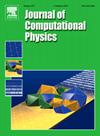动态自适应和完全非结构化四面体网格划分:考虑全流体可压缩性的二氧化碳封存应用
IF 3.8
2区 物理与天体物理
Q2 COMPUTER SCIENCE, INTERDISCIPLINARY APPLICATIONS
引用次数: 0
摘要
通过动态自适应网格划分,复杂地下流动问题和地质力学的数值模拟将取得巨大进步。只有发生急剧变化的大域中的一小部分可能需要精细网格划分。在这项工作中,我们介绍了一种针对大规模流动问题进行动态自适应网格划分的方法。该算法允许进行二维和三维非结构网格划分,并考虑了单相和两相组成流中的全流体可压缩性。我们将一个三角形元素划分为四个,将一个四面体元素划分为八个,这样就在每一级细化中产生了悬挂节点。通过分割额外的元素来消除悬挂节点。因此,在域的细网格和粗网格区域之间存在一个过渡区域。我们将该方法应用于地下含水层的二氧化碳封存。我们选择的条件是,二氧化碳在水相中的溶解导致密度增加,从而形成重力指。所选实例包括过去未报道过系统研究或动态自适应网格划分的大型区域。与均匀网格划分的比较结果表明,在三维空间中,速度最多可提高三个数量级。本文章由计算机程序翻译,如有差异,请以英文原文为准。
Dynamic adaptive and fully unstructured tetrahedral gridding: Application to CO2 sequestration with consideration of full fluid compressibility
Numerical simulations of complex subsurface flow problems and geomechanics will advance enormously by dynamic adaptive gridding. Only a small part of a large domain where sharp changes occur may require fine gridding. In this work, we introduce a methodology to carry out dynamic adaptive gridding for large-scale flow problems. The algorithm allows 2D and 3D unstructured gridding with consideration of full fluid compressibility in single-phase, and two-phase compositional flow. We divide a triangular element into four and a tetrahedron element into eight which creates hanging nodes at each level of refinement. The handing nodes are eliminated by splitting extra elements. As a result, a transition region exists between the fine and coarse grid regions of the domain. We have applied the method to CO2 sequestration in subsurface aquifers. The conditions are selected such that gravity fingers develop from density increase by the dissolution of CO2 in the aqueous phase. The selected examples include large domains where neither systematic studies nor dynamic adaptive gridding have been reported in the past. Results from comparison with uniform gridding reveal a speedup of up to three orders of magnitude in 3D.
求助全文
通过发布文献求助,成功后即可免费获取论文全文。
去求助
来源期刊

Journal of Computational Physics
物理-计算机:跨学科应用
CiteScore
7.60
自引率
14.60%
发文量
763
审稿时长
5.8 months
期刊介绍:
Journal of Computational Physics thoroughly treats the computational aspects of physical problems, presenting techniques for the numerical solution of mathematical equations arising in all areas of physics. The journal seeks to emphasize methods that cross disciplinary boundaries.
The Journal of Computational Physics also publishes short notes of 4 pages or less (including figures, tables, and references but excluding title pages). Letters to the Editor commenting on articles already published in this Journal will also be considered. Neither notes nor letters should have an abstract.
 求助内容:
求助内容: 应助结果提醒方式:
应助结果提醒方式:


